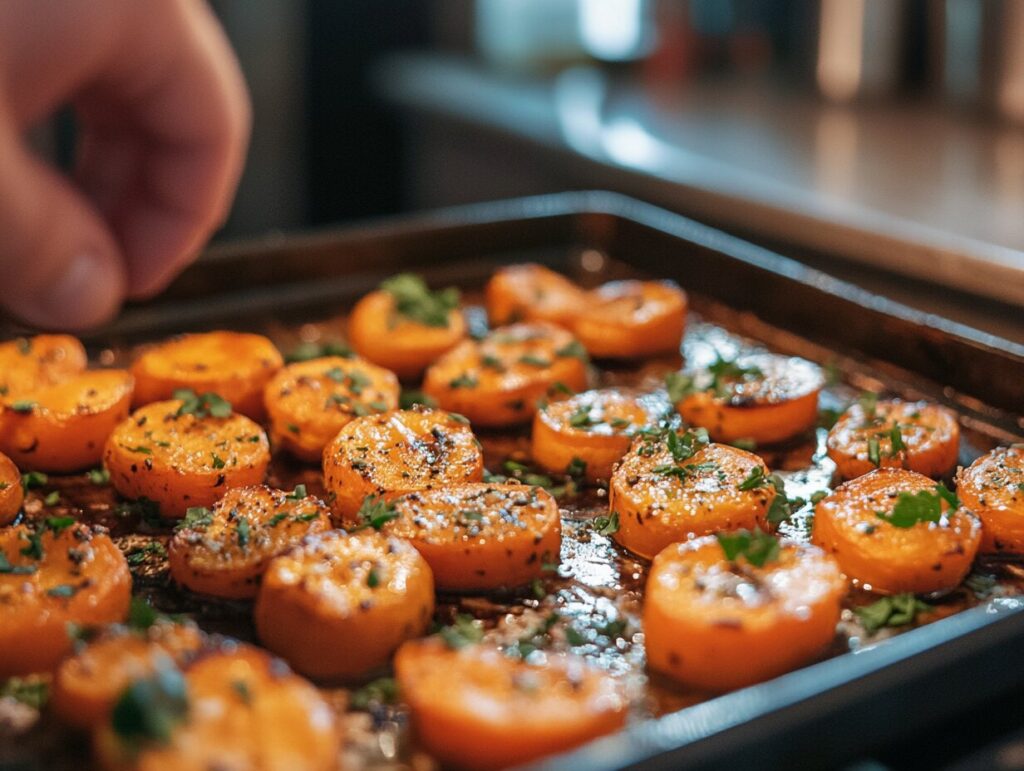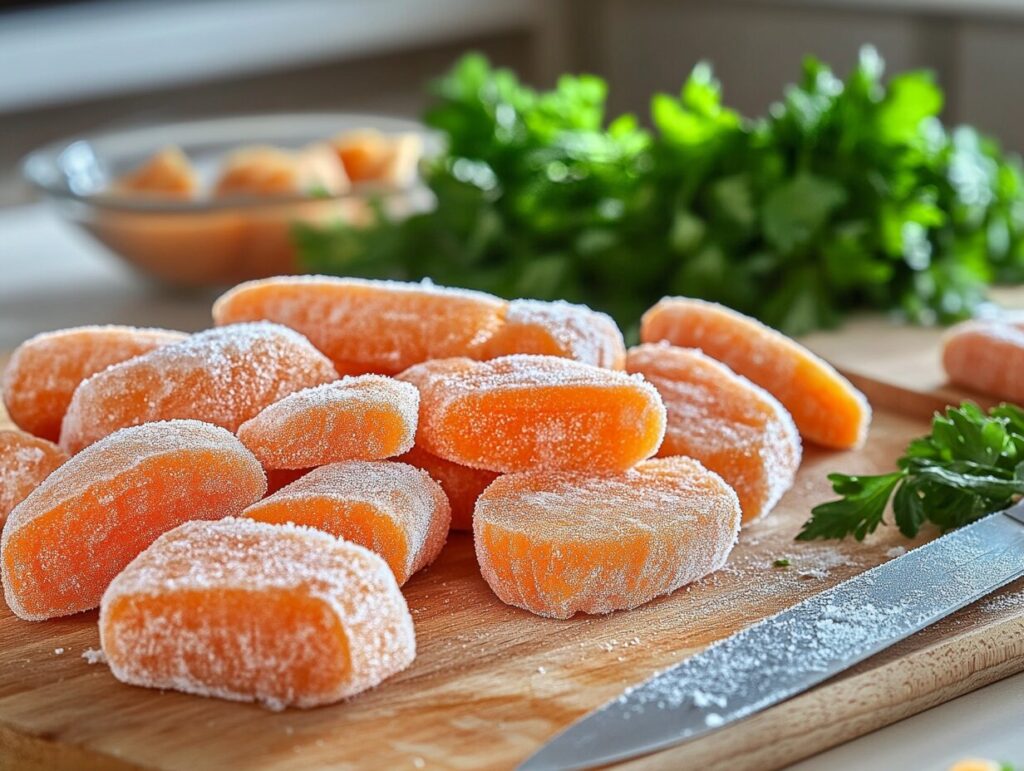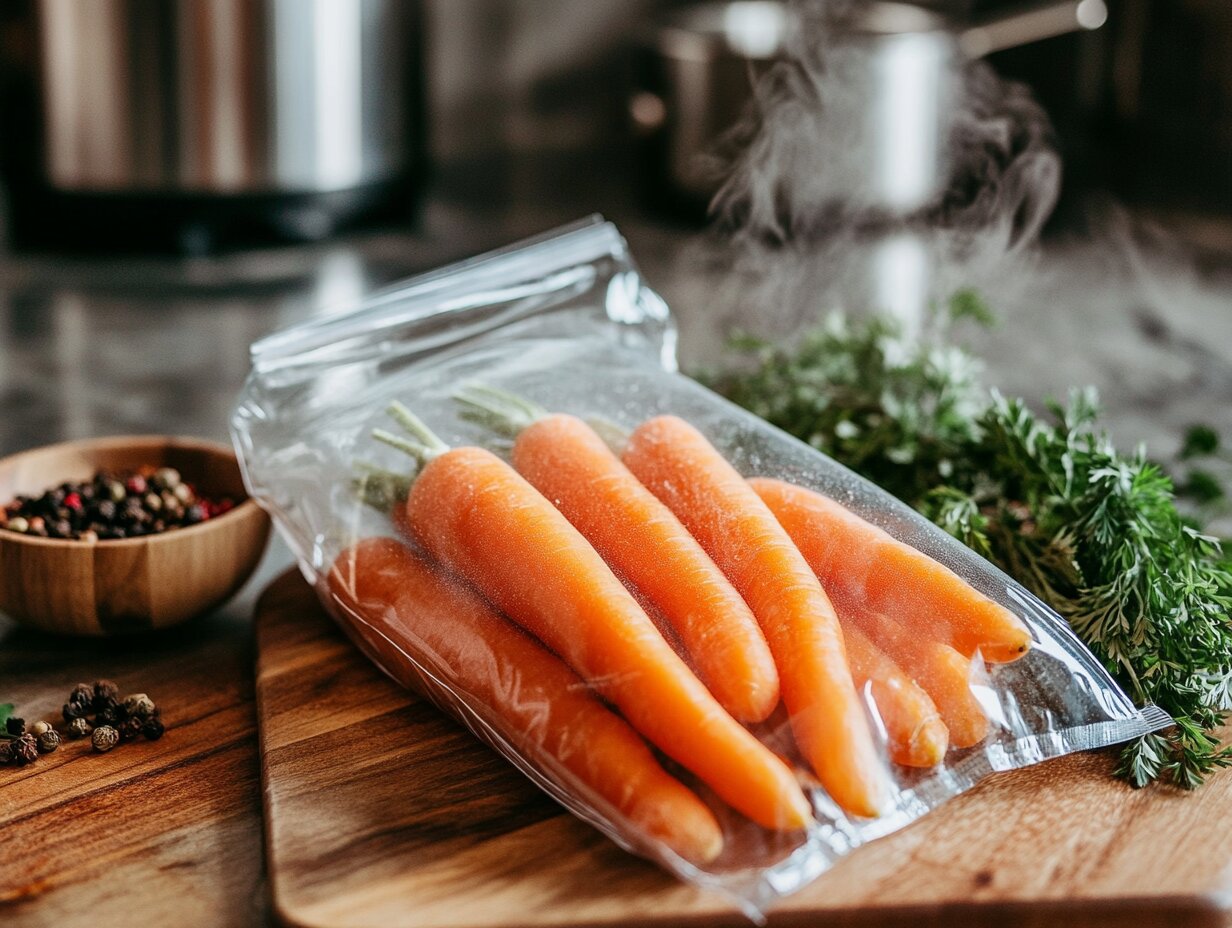Cooking carrots after they’ve been frozen may seem like a culinary mystery to many. The question often arises: can you really achieve the same taste and texture as fresh ones? If you’ve got frozen carrots sitting in your freezer, don’t worry. By the time you’re done reading this, you’ll be an expert on how to cook them like a pro. Let’s unravel this frozen carrot conundrum together.
Understanding Frozen Carrots
Why Freeze Carrots in the First Place?
Freezing carrots is a brilliant way to preserve their nutrients, flavor, and bright orange color. Think of it as hitting the pause button on freshness. Whether you’ve grown too many in your garden, stocked up during a sale, or meal-prepped like a pro, freezing is your trusty sidekick for reducing waste.
Carrots are hardy vegetables, and freezing them locks in their nutrients, ensuring you still get a solid dose of vitamins when you’re ready to cook. So, what’s the big deal? Frozen carrots let you enjoy this versatile veggie year-round.
Common Misconceptions About Frozen Carrots
You’ve probably heard people say frozen carrots are tasteless or always turn mushy when cooked. Well, let’s bust that myth right now. While freezing does slightly alter the texture of carrots, it doesn’t rob them of their flavor or nutrition. In fact, the trick lies in knowing how to cook them correctly.
Another misconception? Thinking frozen carrots are just for soups and stews. Truth is, you can roast, sauté, or even steam them for a vibrant side dish.
Can You Cook Carrots After They’ve Been Frozen?
Absolutely, yes! If you’ve ever asked yourself, “Can you cook carrots after they’ve been frozen?” the answer is simple: not only can you cook them, but they can taste just as good as fresh ones with the right methods. Cooking carrots after they’ve been frozen is a great way to save time and reduce food waste while still enjoying all the nutrients and flavors carrots have to offer.
Many people worry about changes in texture or flavor. While it’s true that freezing can slightly alter the structure of carrots, knowing can you cook carrots after they’ve been frozen and how to do it well makes all the difference. From boiling to roasting, there are so many ways to bring out the best in these frozen veggies.
Cooking carrots after they’ve been frozen doesn’t mean compromising on quality. In fact, frozen carrots often retain more nutrients than fresh ones left sitting too long. So, when you ask yourself again, “Can you cook carrots after they’ve been frozen?” remember the answer is not only yes—it’s an opportunity to create something amazing in the kitchen.
If you’re still wondering, can you cook carrots after they’ve been frozen without thawing? Absolutely! Directly cooking them keeps the process quick and the results consistent. So go ahead, embrace the convenience of frozen carrots, and let your culinary creativity shine.
How Freezing Affects Carrots’ Texture and Flavor
Here’s where science meets the kitchen. Freezing vegetables involves reducing their temperature quickly, which forms ice crystals inside the cells. These crystals expand, and when the carrots thaw, some cellular walls break, resulting in a slightly softer texture.
But don’t fret—this doesn’t ruin the carrots. Instead, it changes the way they respond to cooking. With the right techniques, you can harness this softness to create tender, flavorful dishes.
Benefits of Cooking Frozen Carrots
Cooking frozen carrots is a time-saver, plain and simple. No peeling, chopping, or washing is required—they’re ready to go. Plus, they cook faster because they’re already partially processed during blanching before freezing.
Another bonus? You’re reducing food waste. Frozen carrots often come from surplus harvests, so you’re helping the environment by giving these veggies a second life on your plate.
Methods for Cooking Frozen Carrots
Let’s get to the good stuff: how to cook those frozen beauties. Each method has its charm, depending on the dish you’re aiming for. Ready to experiment?
Boiling Frozen Carrots: Step-by-Step Guide
Boiling is a classic way to cook frozen carrots. Here’s how to do it:
- Bring a pot of water to a rolling boil.
- Add a pinch of salt for flavor.
- Toss in the frozen carrots directly—no need to thaw.
- Let them cook for 5–7 minutes, depending on your desired texture.
- Drain and serve with butter or a sprinkle of herbs.
Quick tip: For soups and stews, add them straight into the broth for a seamless cooking process.
Sautéing Frozen Carrots for Flavorful Dishes
If you love a bit of caramelized flavor, sautéing is your go-to method.
- Heat a tablespoon of olive oil or butter in a skillet.
- Add garlic, onions, or your favorite spices for an aromatic base.
- Toss in the frozen carrots, and stir frequently to ensure even cooking.
- In about 8–10 minutes, you’ll have lightly browned, flavorful carrots that pair perfectly with grains or proteins.
Roasting Frozen Carrots for a Crisp Finish

Roasting is where frozen carrots truly shine. The high heat draws out their natural sweetness while giving them a crispy edge.
- Preheat your oven to 425°F (220°C).
- Spread the frozen carrots on a baking sheet lined with parchment paper.
- Drizzle with olive oil, salt, and pepper.
- Roast for 20–25 minutes, flipping halfway through.
Add a drizzle of honey or balsamic glaze for a gourmet twist.
Steaming Frozen Carrots: Retaining Nutrients
Want to keep things light and healthy? Steaming is a gentle method that locks in nutrients and flavor.
- Place the frozen carrots in a steamer basket over boiling water.
- Cover with a lid and let steam for 8–10 minutes.
- Finish with a squeeze of lemon or a sprinkle of parsley for a fresh touch.
For more dinner inspiration, check out Chicken Eggplant Parmesan: A Hearty, Flavorful Delight
Tips for Optimal Results When Cooking Frozen Carrots
Cooking frozen carrots might sound like a straightforward task, but to truly elevate their taste and texture, there are a few tricks to keep in mind. These tips will help you avoid common pitfalls and ensure your carrots turn out perfect every time. Ready to level up your carrot game?
Thawing Frozen Carrots Before Cooking: Is It Necessary?

One of the first questions people ask is whether they should thaw frozen carrots before cooking. The answer? It depends. For methods like boiling, steaming, or roasting, there’s no need to thaw them. Tossing them in while still frozen retains their moisture and ensures even cooking.
However, if you plan to sauté them or incorporate them into recipes like stir-fries, a quick thaw can help them cook evenly and achieve the right texture. Simply run them under cold water or leave them in the fridge for a few hours.
Seasoning Ideas for Delicious Carrot Recipes
Carrots have a naturally sweet flavor that pairs beautifully with a variety of seasonings. Whether you like them savory or sweet, here are some ideas to try:
- Savory Seasonings: Garlic powder, thyme, rosemary, smoked paprika, or a sprinkle of Parmesan cheese.
- Sweet Additions: Cinnamon, honey, maple syrup, or a dash of nutmeg.
- Global Twists: Curry powder for an Indian flair, soy sauce and sesame oil for an Asian touch, or harissa for a spicy kick.
Don’t be afraid to experiment—carrots are like a blank canvas waiting for your culinary creativity!
Tools and Equipment for Perfectly Cooked Frozen Carrots
To cook frozen carrots like a pro, having the right tools on hand makes all the difference. Here’s a quick checklist:
- Non-stick skillet or sauté pan for even browning during sautéing.
- Baking sheet with parchment paper for roasting without sticking.
- Steamer basket to retain nutrients during steaming.
- Sharp knife for cutting carrots into smaller pieces if needed.
Investing in quality cookware ensures better heat distribution, making your cooking process smoother and your dishes tastier.
you can also check : Dice Carrot Frozen Recipes for Dinner: A Tasty and Convenient Guide
Common Problems and Solutions When Cooking Frozen Carrots
Even with the best intentions, cooking frozen carrots can sometimes lead to less-than-perfect results. Let’s tackle those pesky problems and their simple solutions.
Avoiding Mushy Textures
One of the biggest complaints about cooking frozen carrots is their tendency to turn mushy. Why does this happen? As mentioned earlier, freezing breaks down some of the carrots’ cellular structure, making them softer when cooked.
Solution: Use high-heat cooking methods like roasting or sautéing to draw out moisture and create a firmer texture. Avoid overcooking—less is more when it comes to frozen carrots.
Preventing Loss of Nutrients
Worried that cooking frozen carrots might strip them of their nutrients? This concern is valid, especially if you overcook them or use methods like boiling without care.
Solution: Opt for steaming, which preserves more vitamins and minerals. If boiling, keep the cooking time short and consider using the leftover water as a base for soups or sauces—it’s packed with nutrients!
Enhancing the Flavor of Frozen Carrots
Sometimes, frozen carrots can taste a bit bland if not prepared properly.
Solution: Amp up the flavor with bold seasonings, marinades, or cooking in broths. Adding a splash of citrus or a pinch of zest can brighten the taste, while butter or olive oil enhances richness.
Cooking alongside onions, garlic, or ginger can also work wonders in transforming frozen carrots into a gourmet delight.
Creative Recipes Using Frozen Cooked Carrots
Ready to put those perfectly cooked frozen carrots to good use? Let’s explore some delicious recipes that are as versatile as they are tasty.
Quick Carrot Soup Recipe
This creamy, comforting soup is perfect for chilly evenings or as a light starter.
Ingredients:
- 2 cups frozen carrots
- 1 onion, diced
- 2 cloves garlic, minced
- 2 cups vegetable broth
- 1/2 cup heavy cream
- Salt, pepper, and your favorite herbs
Instructions:
- Sauté the onion and garlic in a pot until fragrant.
- Add the frozen carrots and vegetable broth, then simmer for 15 minutes.
- Blend the mixture until smooth.
- Stir in the cream, season to taste, and garnish with fresh herbs.
Serve with crusty bread for a satisfying meal.
Stir-Fried Carrots and Vegetables
Need a quick side dish? Stir-fried frozen carrots combined with other veggies make a colorful, nutrient-packed option.
Instructions:
- Heat sesame oil in a wok.
- Add frozen carrots, broccoli, bell peppers, and snap peas.
- Stir-fry with soy sauce, a dash of chili flakes, and minced garlic.
- Sprinkle sesame seeds on top before serving.
Roasted Carrot and Herb Salad
Roasted carrots aren’t just a side dish—they can star in a salad!
- Roast frozen carrots until caramelized and golden.
- Toss them with arugula, crumbled goat cheese, and toasted walnuts.
- Drizzle with a honey-lemon vinaigrette for a sophisticated touch.
Health Benefits of Eating Cooked Frozen Carrots
Carrots are a powerhouse of nutrients, and cooking them doesn’t diminish their health benefits. In fact, it enhances some!
Nutritional Value of Frozen Carrots
Frozen carrots retain almost all the vitamins and minerals of fresh ones. They’re packed with vitamin A, which is crucial for vision, skin health, and immune function. Plus, they’re a good source of fiber, helping with digestion and keeping you full longer.
How Cooking Enhances Nutrient Absorption
Did you know that cooking carrots can actually boost the availability of certain nutrients? Heat breaks down the cell walls, making it easier for your body to absorb beta-carotene, the precursor to vitamin A. So, cooking your frozen carrots doesn’t just make them delicious—it makes them healthier too!
Freezing Carrots Properly to Ensure Cooking Success
Cooking frozen carrots begins with how they were prepared and stored in the first place. Proper freezing techniques can significantly impact their texture, taste, and nutrient retention. Let’s dive into the best practices to set yourself up for success when cooking frozen carrots.
Best Practices for Freezing Carrots
Freezing carrots isn’t as simple as tossing them into a bag and throwing them into the freezer. A little preparation goes a long way in preserving their quality.
- Blanch Before Freezing: Blanching, or briefly boiling, carrots before freezing halts enzyme activity that can cause spoilage. It also helps maintain their vibrant color and texture. After blanching, immediately cool them in an ice bath.
- Slice to Size: Cut carrots into slices, sticks, or cubes before freezing. This makes it easier to cook them directly from frozen without additional prep work.
- Use Airtight Packaging: Air exposure can lead to freezer burn, which negatively affects the flavor and texture. Use airtight freezer bags or vacuum-sealed containers to protect your carrots.
- Label and Date: Always label your carrot bags with the date of freezing. Frozen carrots typically stay fresh for up to a year, but knowing when they went into the freezer ensures you use them at their peak.
Avoiding Freezer Burn: Tips and Tricks
Freezer burn can ruin the texture and taste of frozen carrots, but it’s preventable with the right approach.
- Remove as much air as possible from the storage bag. A straw can help suck out the last bit of air before sealing.
- Store the carrots in portion sizes so you don’t expose the entire batch when retrieving a small amount.
- Maintain a consistent freezer temperature—ideally 0°F (-18°C)—to prevent fluctuations that cause ice crystals to form.
Frequently Asked Questions About Cooking Frozen Carrots
Curious minds always want to know more, and frozen carrots are no exception. Here are some of the most common questions answered for your convenience.
Do Frozen Carrots Lose Their Nutritional Value?
Not at all. In fact, freezing preserves the nutrients in carrots exceptionally well. The blanching process that happens before freezing locks in key vitamins like vitamin A and potassium. While there might be a slight loss during the cooking process, the impact is minimal.
How Long Can You Store Carrots in the Freezer?
Carrots can last up to 12 months in the freezer when properly stored. Beyond that, they may lose some flavor and texture, though they’re still safe to eat if stored at a consistent temperature. For the best results, use them within six to eight months.
Are Frozen Carrots Suitable for All Recipes?
Frozen carrots are incredibly versatile, but they shine best in cooked dishes like soups, stews, stir-fries, and roasted sides. While they can work in raw dishes like smoothies, their slightly softer texture might not appeal to everyone.
Cooking Frozen Carrots Made Simple
Cooking carrots after they’ve been frozen doesn’t have to be complicated or intimidating. With a few tips, the right techniques, and a bit of creativity, you can transform frozen carrots into flavorful, nutritious dishes. Whether you’re whipping up a quick stir-fry, roasting them to golden perfection, or blending them into a hearty soup, frozen carrots are a fantastic ingredient to have on hand.
So, the next time you ask yourself, “Can you cook carrots after they’ve been frozen?” the answer is a confident yes! Embrace the convenience, experiment with flavors, and enjoy the countless ways frozen carrots can enhance your meals.
For more articles, check out the Ultimate Guide to Baked Chicken Cutlets.

